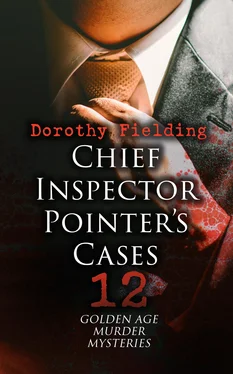"Don't you believe all you're told, sir," she said earnestly. Pointer kept his grave face. "There was nothing of that kind. At least I think so. I mean, I think not." Florence's tone showed that the idea was new to her.
"Then what did Mr. and Mrs. Tangye quarrel about on Monday afternoon? It was a very violent one. He struck her!—" Pointer went on in a low voice. Florence jumped.
"Oh, no, sir! Never! The master wouldn't do such a thing. Besides, it was she who was so angry. He kept trying to pacify her." Florence put her hand to her mouth. Too late. Then she began to cry.
"Oh, I wouldn't do anything to make things worse for any one," she sobbed. "And it hadn't anything to do with her accident the next day, nor to do with this missing money, sir. It hadn't really!"
"Well, of course, if we knew that for certain—" Pointer said in an undecided tone, "of course if we could be sure it had nothing to do with the case why, that might be different. But you're certain it wasn't he who was in a rage?"
"Oh no, sir. That he wasn't! He never is!"
"But you told me that there was no quarrel at all between them? How can I believe you now?"
Pointer did not speak angrily. Florence was a gentle soul. She choked.
"I didn't want to make bad trouble worse, sir. But the mistress did go for the poor master last Monday. She seemed quite beside herself. Yet just before she spoke to me very quiet, as she'd been all day long."
Pointer still looked undecided.
"Well, of course, if we knew for certain what the quarrel was about, and it might not have to be entered at all," he repeated vaguely, "what exactly did Mrs. Tangye say? But be very careful, Florence, to only tell what you really heard. Not what you thought was said."
"I didn't hear anything worth repeating sir. Just half bits and ends. I wasn't listening, only putting something right on the tea-tray that had toppled over. I had to wait a moment before I could come in. The mistress—it's dreadful to say of her now she can't ever speak again—but she was raging wild. 'The house is mine and I insist on your leaving it,' was the only sentence I heard. Complete that is. But she never meant it. Fond of the master she was, and he of her too, in his own way. But she kept on that he was to leave the house. A thing I shouldn't have thought she'd have said. He said he was going all right. But he stayed on for tea after all. So they must have made it up."
"But Mrs. Tangye must have said more than one sentence."
"Lots more, sir, but I couldn't give you her exact words. She said she had come to the limit. That she wasn't going to put up with things any more. That sort of talk, sir. Not meaning half, nor a quarter, of what she said."
"And he?"
"He kept his temper wonderful, sir. Kept hushing her. I heard him say once that she was making mountains out of molehills."
"Didn't he say anything more? I can't believe that there was no reference to money?"
"I didn't hear none, sir. Nothing but his trying to quiet her."
"You didn't hear any names? Such as Bligh, for instance?"
Florence shot him a shrewd look.
"No, sir. But I shouldn't have been surprised if I had."
"You don't think it could have been Mrs. Bligh who came to the house at six yesterday?"
"Oh, no, sir. I know Mrs. Bligh. She comes now and then to our best dinner parties. And I didn't make any mistake in the name, sir. The master read me that telegram, sir. But Cranbourn was the name the mistress gave. And, besides, she talked about her. Said as how she didn't want to be interrupted in her talk, as they hadn't met for so long, Mrs. Cranbourn living in Spain. I can't make out about that cable, sir. Seems to me most mysterious. It does indeed."
Pointer went off on another tack.
"And Mr. Tangye, now, did he ever have any friends in to tea for a chat in his smoking-room?"
"Many a time. Gentlemen only, of course."
"Ah, he'd find that way around to the back gate convenient, I dare say."
Florence looked puzzled for a moment.
"The master never uses that! The room was the housekeeper's when old Mrs. and Mr. Branscombe lived here, so I've heard."
"Didn't Mrs. Tangye sometimes use it? Or any friends of hers?"
Florence thought.
"I don't think so, sir. Though once she showed Miss Eden out that way the last time she stayed here. It is shorter if you're in a hurry to get to the telegraph office."
"When was this?"
"About a month ago."
There was another pause. Pointer seemed to have finished. "By the way, who was it chose the room into which Mrs. Tangye's body was carried?" he asked conversationally.
"She did." This startling reply was explained by Florences' face of indignation.
"That's no way to treat a corpse, is it, sir? Disgraceful, I call it. Cook and Olive and me, we've put all the greenery around we can, but it's not a room fit for a corpse, is it, sir?" Pointer thanked Florence and pausing for a second outside the den to hear the two voices within, slipped upstairs into Tangye's dressing-room. He gave it a quick, but sufficiently thorough search. In the clothes-basket he found a crumpled silk handkerchief, which still smelt of ether, and showed marks of dust. It was Tangye's own handkerchief. It had been used to wipe the safe. But was it he who had used it? Like everything else, it was inconclusive.
Pointer slipped downstairs once more, and let himself into the morning-room. He had "forgotten" to return the key.
He put all thought of the missing notes entirely on one side for the moment. The death was a fact. They were but a tale told him, and a tale with many perplexing features. Even granted moreover, that all was exactly as Tangye said, and even supposing them to be connected with Mrs. Tangye's death, they did not help to solve the immediate problem of how the woman had been killed, supposing the Chief Inspector to be right, and that she had been killed.
It certainly was going to be a stiff proposition to prove a crime there; let alone solve it. Hitherto, even when they had first led the search astray, there had always been some clue, a match, a print of hand or foot, withered leaves, a smear of paint, to serve as a kick-off. To start the ball rolling. But if, as he believed, a murder had been committed here at Riverview, the criminal had done his work very neatly. No tags had been left lying about.
In an obvious murder a detective gets a certain amount of help from the general rule that an inmate of the house stages, or tries to stage, the effect of an outsider, an outsider that is a member of the household.
Clues in such cases read in the reverse direction as it were. But outsider and insider meet and merge in a well-set suicide scene.
The windows had been found latched by the Superintendent. That suggested some one in the house. Pointer and he had questioned Miss Saunders as well as Florence very closely, and both had no reason to think that the companion was holding anything back when she said that she had found them closed. If Pointer put a question mark beside her statement, it was merely because the woman had been in the room before the alarm was given. Was she an accomplice? The suicide effect made that doubtful. This was not a death by force, but by cunning. Mrs. Tangye had not been overpowered. That was certain. But out-witted in some way. So Pointer believed. Nor did the manner of death chosen suggest an accomplice.
Supposing she had 'been killed. How could it have been done? Swiftly he went over the room piece by piece. Still he found nothing suspicious. Finally he took out a couple of photographs which Rogers, the constable, had handed him at the police station. They were the enlargements of the marks on the revolver, and of Mrs. Tangye's finger-prints. He studied the latter first of all. They were certainly wonderfully clear. They had been made by Mrs. Tangye's left hand. There was no doubt of that. Her hand had been so greasy that it had left a perfect impression even of the palm. Yet there was a fitted basin with hot and cold water beside the morning-room. Was it likely that a woman—a lady—would sit still with fingers as buttery as a new cat's paws, and not wash them? Wilmot's suggestion of a slip and a hasty grab, did not explain this—supposing she intended to live. Of course if Wilmot and Haviland were right, Mrs. Tangye might have been so lost in brooding thoughts as to be inaccessible to material things. But the plate on the tea-table with its neat little lake of congealed butter did not bear out the idea of an accident.
Читать дальше












